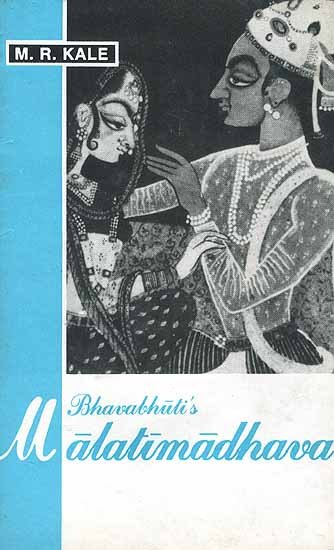Malatimadhava (study)
by Jintu Moni Dutta | 2017 | 52,468 words | ISBN-10: 8120813057 | ISBN-13: 9788120813052
This page relates ‘Raudra Rasa (The Furious Sentiment)’ from the English study on the Malatimadhava of Bhavabhuti:—A Prakarana type of Drama in ten acts revolving around the love-story of Malati (from Padmāvatī) and Madhava (from Vidarbha). This study discusses the history of its author and the literary, social, religious, historical and cultural aspects of the Malatimadhava.
Part 1.3c - Raudra Rasa (The Furious Sentiment)
The Raudra rasa or furious sentiment arises from permanent mood of krodha or anger. It owes its origin to Rākṣasas, Dānavas and haughty men and is caused by fights. This is created by vibhāvas such as anger, rope, abuse, insult, untrue, allegation, exorcizing, threatening, revengefulness, jealousy etc.. Red eyes, knitting of eyebrows, defiance, biting of lips, movement of the cheeks, pressing one hand with the other etc are the anubhāvas and presence of mind, determination, energy, indignation, restlessness, fury, perspiration trembling, horripilation, choking voice are regarded as vyabhicāribhāvas of this sentiment.[1]
Bhavabhūti's depiction of the Raudra rasa in the Mālatīmādhava is also effective. He delineates this rasa with its various feelings at their proper places with all emotions. In the 5th act violent anger of Mādhava to Aghoraghaṇṭa is found where he held up his arm upon Aghoraghaṇṭa saying that Aghoraghaṇṭa deserves no mercy, his arm would strike him down at once like the staff of Yama.[2] Here, it is found that Mādhava has lost his patience when he has faced his enemy. Here, Aghoraghaṇṭa is the cause of the excitement of Mādhava’s anger i.e. ālambanavibhāva, the exorcising is the uddīpanavibhāva, determination is the anubhāva and indulging in sportively for the joke is the vyabhicāribhāva.
The extremely terrific fight between Aghoraghaṇṭa and Mādhava expresses through the verse kaṭhorāsthigranthivyatikararaṇatkāramukharaḥ...................[3] etc where both are taking sword at hand and say to each other that the sword at once will scatter their flesh; the sword creates noise like twang due to the clash with the joints of the tough bones, the speed of sword restrains for a moment in cutting the strong muscles that are very stiff. Here, it has been noticed that excess of anger has led them to fight against each other and thus it gives rise to Raudra rasa. Thus, Bhavabhūti delineates this Raudra rasa very skilfully with the delineation of appropriate emotion.
Footnotes and references:
[1]:
atha raudro nāma krodhasthāyibhāvātmako rakṣodānavodhatamanuṣyaprakṛitiḥ saṃgrāmahetukaḥ sa ca krodhāgharṣanādhikṣepānṛtavacanopadhāta vākpāruṣyā bhidro hamātsaryādi bhirvibhāvairutpadyate /
tasya ca tāranapāṭanapīḍana chedanabhedana praharaṇāharaṇaśastrasaṃpātasamprahāra rudhirākarṣanādyāni karmāṇi/
punaśca raktanayana bhrūkuṭī karaṇadantoṣṭha pīḍana gaṇḍo
sphuraṇa hastāgraniṣpeṣādibhiranubhāvairabhinayaḥ prayoktavyaḥ /
Nāṭyaśāstra,VI.p.319-320
